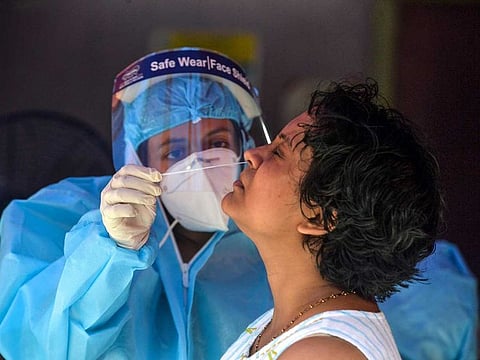Omicron threat in India: Calls for booster dose grow
With India reporting confirmed cases of the Omicron variant, experts advise caution

A wave of panic has struck the world after South Africa’s scientists discovered a new, highly transmissible variant of the coronavirus called Omicron. Doctors say it’s still too early to comment on the severity of disease this version will cause (we will only know in a few weeks) but we do know it is highly infectious and may possibly evade current vaccines around the world.
One thing that most doctors are unanimously saying however is that not two, but three shots actually qualify you as fully vaccinated, which is why the US and the UK have speeded up their booster programmes in recent days.
However, here in India, there has been a baffling response from the main medical body, the Indian Council for Medical Research or the ICMR. Despite the availability of vaccines, there is a bizarre reluctance to start boosters for the elderly and frontline workers who got their second shot well over six months ago.
Six month gap
In the UK, doctors had advised a six month gap between the 2nd dose and a booster but they have reduced this to three months now due to the new variant.
In India, the ICMR’s boss, Dr Balram Bhargava recently said there is “no scientific evidence so far to support the need for a booster vaccine dose against COVID-19”. His statement flies in the face of everything scientists and doctors are saying in other countries.
In Israel, third doses were started months ago for all above the age of 12 after the Delta variant ripped through their largely fully vaccinated population. Scientists found that immunity with vaccines was waning over a period of time.
According to a BBC report, a study of fully vaccinated over-60s found that those who had received a booster dose five months after their second shot had much better immunity — they were over 11 times less likely to be infected with Covid-19, and 19 times less likely to develop severe illness than those who had not received the third dose.
A study done in the UK found that two doses of the Pfizer/BioNTech vaccine were 88% effective after one month, compared to 74% after five or six months. The Oxford/AstraZeneca vaccine declined from being 77% to 67% effective. Therefore, boosters.
Vaccines about to expire
But in India, our policymakers are still looking for evidence that we need a third shot. Earlier this month, the Times of India and the Hindu reported that many doses of the vaccine are soon to expire in India.
With a shelf life of 6 months, a large quantity will expire in January and many experts rightly say that wasting even a single one amounts to criminal negligence and therefore should be used as boosters. The health ministry says about 16 crore doses are lying unused with states.
Government officials have so far argued that the priority is to give the second dose to those eligible. But when there are vaccine stocks available and with many like to be going to waste, why are authorities taking this obtuse position on boosters for the vulnerable?
The serum institute’s Adar Poonawala told NDTV this week, “We have hundreds of millions of stock in our campus. We have over 200 million doses reserved for states and Union Territories in India. So, if the government is to announce a booster dose, we are well stocked.”
It is also true that India’s vaccination drive has slowed down. Recent data shows that 84.3% of the eligible population has received the first dose but only about 49% of the population has had the second one. One report says over 7 crore people have missed their second dose, pointing to hesitancy and perhaps complacency.
As long as we have vaccine stocks, everything must be done to push people to get their second shot and give boosters to over 60s and those with co morbidities and frontline workers.
With several states demanding the roll-out of booster doses of COVID vaccines for adults and vaccination for children, Union Health Minister Mansukh Mandaviya said in Parliament Friday that the Government will move forward on these two key issues only on the basis of scientific recommendations of its two expert groups on vaccine administration.
We don’t know how the new Omicron variant will play out but we do know immunity wanes with vaccines and getting a third shot is the best chance we have. Dear ICMR, please get your head out of the sand.
Sign up for the Daily Briefing
Get the latest news and updates straight to your inbox








